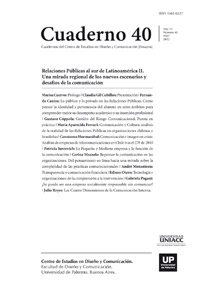Tecnología y organizaciones: de la comprensión a la intervención
Abstract
The article presents the problematic of the complex interaction of technology in the
scope of the present organizational structures. In the present globalised scene, no organization
would have to choose the opacity and the survival isolated in a territory of technological and
communicational multiple interactions.
The communicational practices within an organization happen to comprise of the ampler medial resources of their members. It cannot seem irrelevant to consider that the new communicational interactions based on Internet, are multimedia, allow the own creation of contents, the
homing emission and the selection in the reception process.
It would be a nonsense to manage a communicational change in an organization in which the
platforms available are underneath, in cover and format, of the personal communicational
practices of his members.
It turns out reasonable, therefore, to formulate the planning of technological changes in the
organizations on the basis of the knowledge of the external and internal scenes, and the practices of his members. Simple voluntarism, the mere desire to be up-to-date or ignorance of the
technological practices, usually are the worse advisors for an intervention that it looks for to
be successful.
References
Basalla, G.(1991). La evolución de la tecnología. Barcelona: Editorial Crítica.
Cardwell, D. (1996). Historia de la Tecnología. Madrid: Alianza Editorial.
Cardoso, G. (2008). From Mass to Networked Communication: Communication Models and
the Information Society. International Journal of Communication 2, 587-630.
Carey, J. (1989). Communication as Culture. New York and London: Routledge.
Castells, M. (2007). Communication, power and counter-power in the network society. International Journal of Communication, I: 238-266.
Castells, M.; Fernández-Ardevol, M.; Qiu, J. y Sey, A. (2007). Mobile communication and society.
A global perspective. Cambridge, Massachusetts: The MIT Press.
Castells, M. y Cardoso, G. (editores) (2005). The Network Society: From Knowledge to Policy.
Washington, DC: Johns Hopkins Center for Trasatlantic Relations.
Eco, U. (1994). Apocalypse Postponed. Bloomington and Indianapolis: Indiana University Press.
Heidegger, M. (1954). La pregunta por la técnica. En, Heidegger, M. (1997). Filosofía, Ciencia y
Técnica. Santiago de Chile: Editorial Universitaria.
Kolakowski, L. (1971). Tratado sobre la Mortalidad de la Razón. Caracas: Monte Ávila Editores.
McLuhan, M. (1964). Understanding Media: The Extensions of Man. New York: The New American Library.
Snow, C.P. (1977). Las dos culturas y un segundo enfoque. Madrid: Alianza Editorial.
Otero, E. (2008). Tecnología, medios de comunicación, comunicación inalámbrica e investigación. En, El mundo en mi mano. La revolución de la telefonía móvil. Santiago: Centro de Estudios Universitarios (CEU), de Universidad UNIACC.
Otero, E. (2004). Teorías de la Comunicación. Santiago de Chile: Editorial Universitaria(2da. Ed.)
Otero, E. (2002). Ensayos de Epistemología. Santiago de Chile: Bravo-Allende Editores.
Shelley, M. (2005). Frankenstein, o el moderno Prometeo. Santiago de Chile: Editorial Andrés Bello.
Winner, L. (1979). Tecnología autónoma. Barcelona: Editorial Gustavo Gili.
Ziman, J. (1980). La Fuerza del Conocimiento. Madrid: Alianza Editorial.
Los autores/as que publiquen en esta revista ceden los derechos de autor y de publicación a "Cuadernos del Centro de Estudios de Diseño y Comunicación", Aceptando el registro de su trabajo bajo una licencia de atribución de Creative Commons, que permite a terceros utilizar lo publicado siempre que de el crédito pertinente a los autores y a esta revista.


